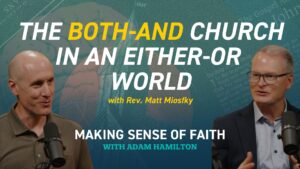What does a movement do when its charismatic founder and leader changes roles?
Every business, school, sports franchise, and church has to grapple with that question. The world is full of ideas and case studies for “succession planning,” and every field is full of examples of both failure and success in maintaining “momentum” when a key leader moves on.
But what if that leader was God in the flesh?
That was what early Christians (and Christians to this day) believe Jesus was. Yet the New Testament record said that about 40 days after his triumph over death in his resurrection, Jesus “was taken up” (Acts 1:2). He left behind a not particularly large (120—Acts 1:15) or impressive group of followers (they’d all fled in terror just weeks earlier when he was arrested), and a promise that must have sounded improbable: “You will receive power when the Holy Spirit has come upon you, and you will be my witnesses in Jerusalem, in all Judea and Samaria, and to the end of the earth” (Acts 1:8).
Different messengers, but the same mission and message.
The book of Acts that recorded all this was “volume two” of the gospel of Luke. Along with the collection of New Testament letters that Christians copied and preserved, it showed that although Jesus was the central person and vital focus of God’s saving mission, that mission did not end when the risen Jesus left the earth, as we might have expected. Far from it! But in a mysterious sense, Jesus didn’t exactly “leave” at all. Before the crucifixion, he had told the disciples, “I won’t leave you as orphans. I will come to you” (John 14:18). In Acts 2, the promised Holy Spirit descended on God’s people in a dramatic way to empower them to carry on the mission Jesus had launched when present with them. Different messengers, but the same mission and message—and ultimately the same divine power at work as before.
Christians lived in the confidence that Jesus had made ultimate victory over evil certain.
Unlike the yearning sense of hope that filled much of the Old Testament’s story, now (even in the face of venomous ridicule and persecution by the Roman Empire) the Christians spoke and lived in the joyous confidence that the Messiah had come. Yes, they still waited eagerly (as Christians still do) for the day when Jesus returns and God’s victory over evil, won in the cross and resurrection, is made complete. But, just as the D-day invasion in 1944 sealed the defeat of Hitler’s murderous regime even though it took another year of battles to complete the victory in 1945, so the Christians lived in the confidence that Jesus had made ultimate victory over evil certain. Rome could do its worst (and many times did), but the Christians marched on, certain that Jesus had even “set free those who were held in slavery their entire lives by their fear of death” (Hebrews 2:15). Historical records show Roman soldiers and officials expressing vexation: how were they supposed to stop people who would not stop even when you threatened to kill them?
The first part of Acts showed the Holy Spirit leading the apostles Peter and Phillip to reach beyond the comfortable boundaries of their Hebrew background and share Jesus’ good news with Roman centurions and Ethiopian eunuchs. Saul of Tarsus did a 180 degree turn after Jesus met him on the road to Damascus from being a zealous persecutor of Christians to being a learned, often fiery, missionary determined to carry Jesus’ mission to every corner of the Roman empire if he could. Acts was honest about various personal and theological issues the early Christians had to work out, sometimes in harmony, sometimes through conflict. But it also made it plain that none of those issues ultimately derailed the early Christians from their devotion to Jesus and his mission on the earth.
And God’s mission has gone on through the centuries, right up to the present.
Jesus does not physically walk the earth today, but at their best Christians walk the earth in Jesus’ place. The Holy Spirit guides all Christians, the church universal, to keep their eyes on God’s mission—to set the world right through Jesus Christ. God’s mission is for a community, not just for individuals. All of Christ’s followers, together, are the agency God is forming to make the world right—to faithfully pursue seeing God’s dream for the world, a Kingdom marked by wholeness, made real.
God sent Jesus. Jesus promised the Holy Spirit. The Holy Spirit sends the church into the world to be witness to the person and work of Jesus.
The people who make up church spread the good news that in Jesus Christ there is salvation from brokenness and for fullness of meaningful life. Jesus commissioned his people, and the Holy Spirit empowers his people, to do God’s redemptive work in the world.
This redemptive work can take many forms, from sharing the good news to caring for the sick, from feeding the poor and visiting the imprisoned to crossing international boundaries and learning new cultures to share Jesus with them. This redemptive work takes God’s people one step closer to living into the image in which God created them. Living out their purpose, they participate with God to restore the world toward its intended wholeness.
The Holy Spirit was the guide and the power for the first Christians and is still that for all who choose to be God’s people today.
The Holy Spirit is present with all who honestly seek the Spirit’s presence. Humans have as much of the Holy Spirit as they ask for and respond to in faith. A key spiritual discipline is to learn to listen to the Spirit’s prompting in the heart and do what the Spirit nudges a person to do.













